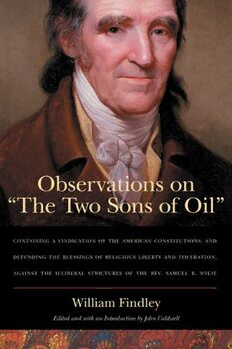
Observations on the Two Sons of Oil: Containing a Vindication of the American Constitutions, and Defending the Blessings of Religious Liberty and Toleration, Against the Illiberal Strictures of the Rev. Samuel B. Wylie PDF
304 Pages·2007·1.633 MB·English
Most books are stored in the elastic cloud where traffic is expensive. For this reason, we have a limit on daily download.
Preview Observations on the Two Sons of Oil: Containing a Vindication of the American Constitutions, and Defending the Blessings of Religious Liberty and Toleration, Against the Illiberal Strictures of the Rev. Samuel B. Wylie
Description:
William Findley was an important, if lesser-known, politician during the early national period of American history. He was a captain in the Revolutionary army, an Anti-Federalist, and a forty-year veteran politician of both state and national office. In the Pennsylvania ratifying convention he had vigorously opposed the approval of the proposed Constitution because he felt that it did not guarantee the protection of some basic liberties such as jury trial; religious freedom; and freedom of speech, assembly, press, etc. After the Bill of Rights was adopted, Findley became a strong supporter of the Constitution. "Observations on 'The Two Sons of Oil'" was written in 1811 in response to the Reverend Samuel B Wylie's work, "The Two Sons of Oil", which was published in 1803. In this work of radical Presbyterian theology, Wylie pointed out what he considered to be deficiencies in the constitutions of both Pennsylvania and the United States and declared them to be immoral.Findley's response to Wylie's criticisms in "Observations" showed that it was neither the purpose nor the design of the United States government to have a federal religion and a federal creed. In a broader sense the book is also a passionate defense of a civil government guided by moral principles that allow for essential freedoms. Findley's defense of religious liberty and the American constitutions affords a grand window through which to view early American understanding about the relationship between politics and faith and why it is essential for both liberty and piety to resist any attempt to unite government and Church. This new Liberty Fund edition will make this work available once again; "Observations on 'The Two Sons of Oil'" has not been republished since its original publication in 1812.Scholars of American history, government, and religion will appreciate the new availability of this book, which provides critical insight into Americans' conception of liberty in the nation's formative years. In addition, readers concerned with renewed debates around the world on the separation of church and state will appreciate the timelessness of Findley's arguments for secular government and its compatibility with religious beliefs.
See more
The list of books you might like
Most books are stored in the elastic cloud where traffic is expensive. For this reason, we have a limit on daily download.
